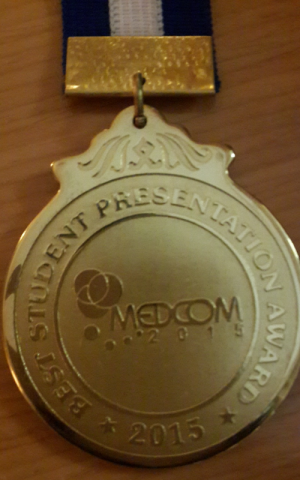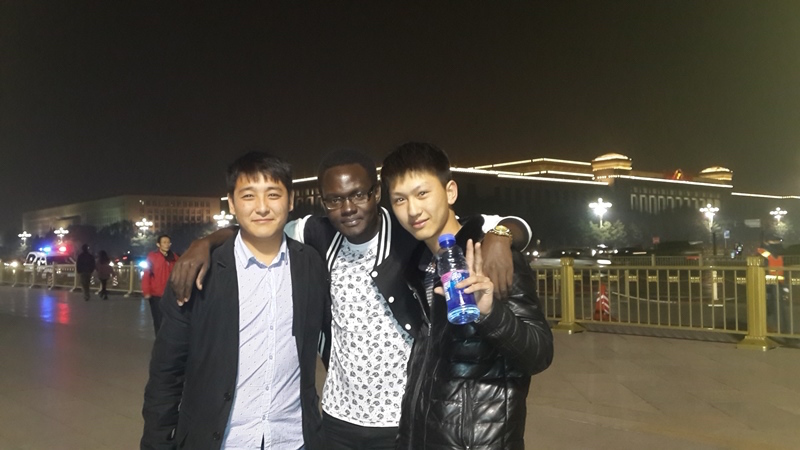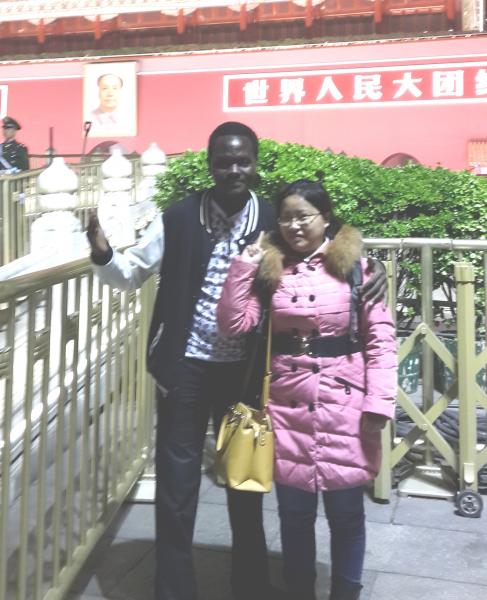
There is something nice about being a black man combing the streets of Beijing. You know you will be excused if you fail to confirm to all  the customs of a beautiful lonely metropolitan. This is what I thought and so started taking pictures of everything within focus. The words describing the buildings I was photographing were written in Mandarin of course, which added to the fun. Some of the Chinese characters looked like a smiling face, or a disorganised bundle of sticks. I didn’t want to be held back by things I didn’t understand so I continued taking pictures in all directions, until when a relatively short man with a round chilling face, wearing a green Chinese military uniform waved me off from a distance. I walked away at a speed that I though was faster than a blink of an eye. Although I didn’t understand Chinese, his hand had spoken a universal language.
the customs of a beautiful lonely metropolitan. This is what I thought and so started taking pictures of everything within focus. The words describing the buildings I was photographing were written in Mandarin of course, which added to the fun. Some of the Chinese characters looked like a smiling face, or a disorganised bundle of sticks. I didn’t want to be held back by things I didn’t understand so I continued taking pictures in all directions, until when a relatively short man with a round chilling face, wearing a green Chinese military uniform waved me off from a distance. I walked away at a speed that I though was faster than a blink of an eye. Although I didn’t understand Chinese, his hand had spoken a universal language.
 Later that evening, after having a dinner of Chinese Hotpot, and travelling 28 minutes by train, I reached at the famous Tiananmen Square and started taking pictures (again). I was enjoying this, taking pictures of the symbol of the Chinese power, until when I turned around and saw all the Chinese people taking pictures of me. My female companion told me eventually that they were begging to pose for pictures with me. For the next 45 minutes, I was more famous than the huge Mao Zedong portrait which lit up Tiananmen Square, and never even got to know why.
Later that evening, after having a dinner of Chinese Hotpot, and travelling 28 minutes by train, I reached at the famous Tiananmen Square and started taking pictures (again). I was enjoying this, taking pictures of the symbol of the Chinese power, until when I turned around and saw all the Chinese people taking pictures of me. My female companion told me eventually that they were begging to pose for pictures with me. For the next 45 minutes, I was more famous than the huge Mao Zedong portrait which lit up Tiananmen Square, and never even got to know why.
Somehow, with my jaws stiff a little from all the coached smiles I put on during the photo-shoot, the evening made me forget the incident  that had happened at the airport when I was pulled out of a very long queue, as the only black person, into a room in which two soldiers inspected my passport, checking all my visas (including my South African study permit), with metals I can’t even give a name.
that had happened at the airport when I was pulled out of a very long queue, as the only black person, into a room in which two soldiers inspected my passport, checking all my visas (including my South African study permit), with metals I can’t even give a name.
From the airport terminal to the taxi, I was still wondering what that was all about, until when I remembered the three signs I had seen at the visa-checking counters: One counter was for “Chinese Nationals”, the other was for “Non-Chinese” travellers, and the last counter was for “West Africans”. I would have told the taxi driver about it, were we able to understand each other. He was kind enough though to drive ahead although he didn’t understand a single word I was saying. He said several sentences in Chinese while driving, after which he laughed. I replied with a few sentences of my own in English, including where am from, my name and the hotel I was going to and laughed too. At this point, we both laughed as he sped-off, both of us having no idea where we were going.
I had arrived in Beijing to present a paper at the World Conference on Media and Mass Communication hosted by the University of Northern Colorado. On top of the cold foggy April weather that engulfed Beijing, the airport and taxi experience helped me to predict further strangeness throughout my stay in China. Throughout the conference presentations done by people from the US, England, Brazil, Mexico, Germany and several other countries that I had heard of before, and none from China (ironically), the idea of new media resonated well, even in presentations that discussed traditional media. My presentation was the second last but it attracted some attention because no one in the room had heard of community audio towers used as a media platform. Without doubt, my presentation introduced some strangeness into the conference atmosphere. I was awarded the Best Student Presentation Medal at the medal awarding ceremony, after which I packed my bags and left China in the company of a beautiful Chinese friend.
By Brian Semujju
- Log in to post comments




